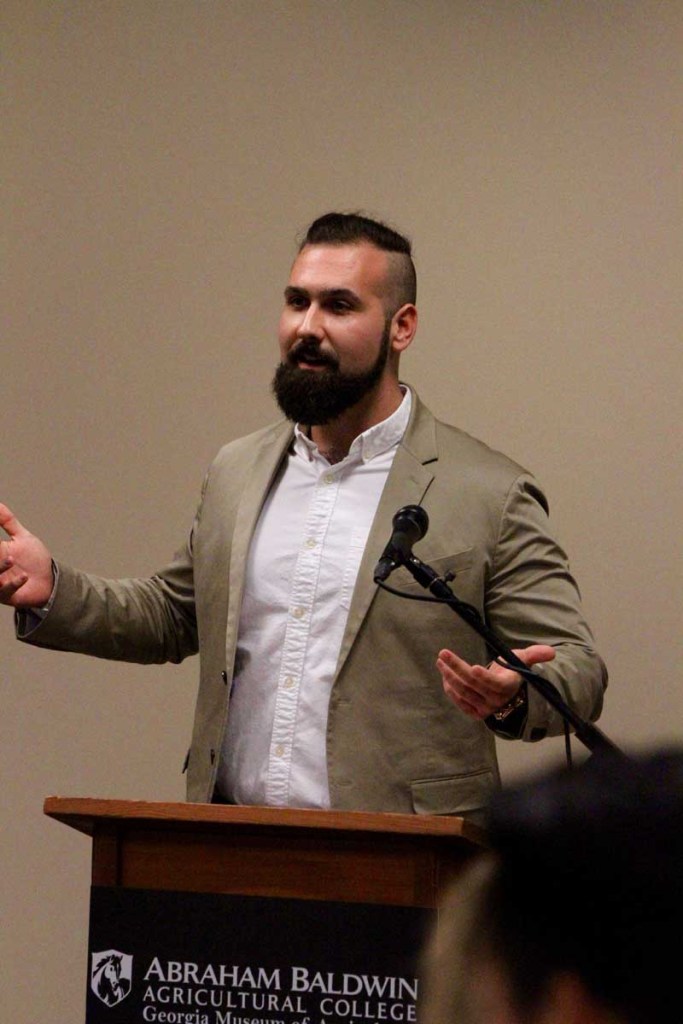Recovery Community Organization Symposium scheduled for Feb. 24
Published 7:00 pm Monday, February 19, 2018

- Nicholas Estabrook, from the Georgia Council on Substance Abuse, explained how the community can benefit from supporting local recovery services.
TIFTON — After more than a year of planning, meetings and forums, a symposium about establishing a Recovery Community Organization (RCO) in Tift County has been scheduled for 10 a.m. — 2 p.m., Feb. 24 at Southern Regional Technical College’s Tifton campus.
Judge Herbert Benson, one of the driving forces behind the push to address the opioid crisis in Tift County, has been working with area organizations, such as the Tift County Accountability Courts and Tift Regional Medical Center, as well as state organizations like the Georgia Council on Substance Abuse, to grow community support for an RCO.
Trending
An RCO, Benson explained while addressing the Tifton/Tift County Chamber of Commerce meeting on Feb. 15, is a safe space for recovering addicts.
He said RCOs assist and support people in their recovery efforts, and can offer many different paths for addicts who are trying to turn their lives around.
It would offer guidance and counseling, according to Benson, for those who are just beginning a path to recovery and help for those who are already in recovery but need help reintegrating into the community.
An RCO would not be a part of the accountability drug court, which was established last year and works to steer individuals into recovery programs.
“We’re very proud of what we’ve accomplished in the last year with the accountability court,” he said. “But those courts are only dealing with people who have broken the law. We still have a large population walking around every day with an addiction problem that aren’t part of the criminal justice system.
“It’s easy to say, ‘I don’t have to worry about that because I don’t have an addiction.’ But there’s not anyone in this room who can honestly say they don’t know anyone who has been affected by an addiction.”
Trending
Benson added that 73 percent of everyone who uses illegal drugs are employed.
“Seventy-three percent of illegal drug users are working for y’all,” he told the assembled Chamber of Commerce members. “They’re in your workplace. They triple the number of days absent because of substance abuse. They multiply the number of workman’s comp claims that y’all have because of substance abuse.”
He added that addiction is a disease that affects people regardless of color, gender and class.
Nicholas Estabrook, RCO development project coordinator with the Georgia Council on Substance Abuse, spoke about the benefits of an RCO from the perspective of someone who is in long term recovery.
“We have prevention services,” he said. “We have treatment facilities, detox centers, hospitals. But what do we have on a public level when it comes to continued recovery support services? We don’t really have that.”
Filling that need is exactly the role on an RCO.
Estabrook, who has been involved with RCO planning for approximately two years, said that every community can benefit from the organization.
“For every dollar spent on treatment and recovery, the community will see an average of a seven dollar return on that investment,” he said.
Community support is key to the success of an RCO, he said, especially with regards to funding, which can be an issue.
“The most successful way to fund an RCO is by involving as many members of the community as possible to be a part of developing that RCO,” he said.
There is currently no set funding for RCOs on either the state or federal level, Estabrook said.
Follow Eve Guevara on Twitter @EveGuevaraTTG.


